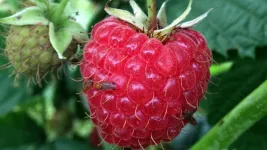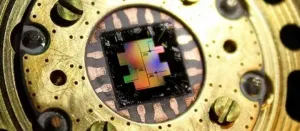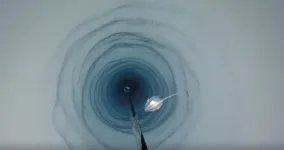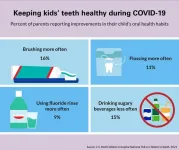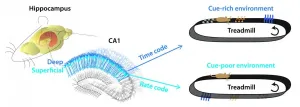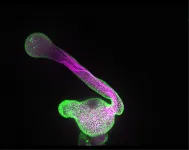(Press-News.org) A recent study finds that the invasive spotted wing drosophila (Drosophila suzukii) prefers to lay its eggs in places that no other spotted wing flies have visited. The finding raises questions about how the flies can tell whether a piece of fruit is virgin territory - and what that might mean for pest control.
D. suzukii is a fruit fly that is native to east Asia, but has spread rapidly across North America, South America, Africa and Europe over the past 10-15 years. The pest species prefers to lay its eggs in ripe fruit, which poses problems for fruit growers, since consumers don't want to buy infested fruit.
To avoid consumer rejection, there are extensive measures in place to avoid infestation, and to prevent infested fruit from reaching the marketplace.
"Ultimately, we're talking about hundreds of millions of dollars in potential crop losses and increases in pest-management costs each year in the United States," says Hannah Burrack, co-author of a paper on the study and a professor of entomology at North Carolina State University. "These costs have driven some small growers out of business.
"The first step toward addressing an invasive pest species is understanding it. And two fundamental questions that we had are: Which plants will this species attack? And why does it pick those plants?"
One of the things that researchers noticed when observing infestations on farms was that the species' egg-laying behavior was different, depending on the size of the infestation.
When D. suzukii populations were small, there would only be a few eggs laid in each piece of fruit, and they would only be in ripe fruit. If there were more D. suzukii present, more eggs would be laid in each piece of fruit. The researchers had also noticed that large populations of D. suzukii were also more likely to lay eggs in fruit that wasn't ripe.
To better understand the egg-laying behavior of D. suzukii, the researchers conducted a series of experiments. And the results surprised them.
Specifically, the researchers found that, given a choice, female D. suzukii preferred to lay their eggs in fruit that other flies had never visited.
"It doesn't matter if the other flies lay eggs," Burrack says. "It doesn't even matter if the other flies are male or female. It only matters if other flies have touched a piece of fruit. If untouched fruit is available, D. suzukii will reject fruit that other flies have visited.
"We're not sure if the flies leave behind a chemical or bacterial marker, or something else entirely - but the flies can tell where other flies have been."
The researchers say that the next step is to determine what, exactly, the D. suzukii are detecting.
"If we can get a better understanding of what drives the behavior of this species, that could inform the development of new pest-control techniques," Burrack says. "We're not making any promises, but this is a significant crop pest - and the more we know, the better."
INFORMATION:
The paper, "Social signals mediate oviposition site selection in Drosophila suzukii," is published in the journal Scientific Reports. Corresponding author of the paper is Johanna Elsensohn, who did the work while completing her Ph.D. at NC State. The paper was co-authored by Marwa F. K. Aly, a faculty member of Minia University, and Coby Schal, the Blanton J. Whitmire Distinguished Professor of Entomology at NC State.
The work was done with support from: the U.S. Department of Agriculture National Institute of Food and Agriculture's Organic Agriculture Research and Extension Initiative, under grants 2018-02859 and 2015-07403; USDA's Animal and Plant Health Inspection Service, under cooperative agreement 17-8130-0194-CA; National Science Foundation Integrated Graduate Education and Research Training grant number 1068676; and an Egyptian government scholarship to Aly.
Aalto researchers have used an IBM quantum computer to explore an overlooked area of physics, and have challenged 100 year old cherished notions about information at the quantum level.
The rules of quantum physics - which govern how very small things behave - use mathematical operators called Hermitian Hamiltonians. Hermitian operators have underpinned quantum physics for nearly 100 years but recently, theorists have realized that it is possible to extend its fundamental equations to making use of Hermitian operators that are not Hermitian. The new equations describe a universe with its own peculiar set of rules: for example, by looking in the ...
It was tens of miles wide and forever changed history when it crashed into Earth about 66 million years ago.
The Chicxulub impactor, as it's known, left behind a crater off the coast of Mexico that spans 93 miles and goes 12 miles deep. Its devastating impact brought the reign of the dinosaurs to an abrupt and calamitous end by triggering their sudden mass extinction, along with the end of almost three-quarters of the plant and animal species then living on Earth.
The enduring puzzle has always been where the asteroid or comet that set off the destruction originated, and how it came to strike the Earth. And ...
The UK's commercial fishing industry is currently experiencing a number of serious challenges.
However, a study by the University of Plymouth has found that managing the density of crab and lobster pots at an optimum level increases the quality of catch, benefits the marine environment and makes the industry more sustainable in the long term.
Published today in Scientific Reports, a journal published by the Nature group, the findings are the result of an extensive and unprecedented four-year field study conducted in partnership with local fishermen off the coast of southern England.
Over a sustained period, researchers exposed sections of the seabed to differing densities of pot fishing and monitored any impacts using a combination of underwater videos and catch ...
It forever changed history when it crashed into Earth about 66 million years ago.
The Chicxulub impactor, as it's known, left behind a crater off the coast of Mexico that spans 93 miles and runs 12 miles deep. Its devastating impact brought the reign of the dinosaurs to an abrupt and calamitous end by triggering their sudden mass extinction, along with the end of almost three-quarters of the plant and animal species living on Earth.
The enduring puzzle: Where did the asteroid or comet originate, and how did it come to strike Earth? Now, a pair of researchers at the Center for Astrophysics | Harvard & Smithsonian believe they have the answer.
In a study published today in Nature's Scientific Reports, Harvard University ...
When the Covid-19 pandemic struck in early 2020, doctors and researchers rushed to find effective treatments. There was little time to spare. "Making new drugs takes forever," says Caroline Uhler, a computational biologist in MIT's Department of Electrical Engineering and Computer Science and the Institute for Data, Systems and Society, and an associate member of the Broad Institute of MIT and Harvard. "Really, the only expedient option is to repurpose existing drugs."
Uhler's team has now developed a machine learning-based approach to identify drugs already on the market that could ...
A new study finds that California's commuters are likely inhaling chemicals at levels that increase the risk for cancer and birth defects.
As with most chemicals, the poison is in the amount. Under a certain threshold of exposure, even known carcinogens are not likely to cause cancer. Once you cross that threshold, the risk for disease increases.
Governmental agencies tend to regulate that threshold in workplaces. However, private spaces such as the interior of our cars and living rooms are less studied and less regulated.
Benzene and formaldehyde -- both used in automobile manufacturing -- are known to cause cancer at or above certain levels of ...
Far underneath the ice shelves of the Antarctic, there's more life than expected, finds a recent study in the journal Frontiers in Marine Science.
During an exploratory survey, researchers drilled through 900 meters of ice in the Filchner-Ronne Ice Shelf, situated on the south eastern Weddell Sea. At a distance of 260km away from the open ocean, under complete darkness and with temperatures of -2.2°C, very few animals have ever been observed in these conditions.
But this study is the first to discover the existence of stationary animals - similar to sponges and potentially several previously unknown species - attached to a boulder on the sea floor.
"This discovery is one of those ...
ANN ARBOR, Mich. - A third of parents say the COVID-19 pandemic has made it difficult to get dental care for their children, a new national poll suggests.
But some families may face greater challenges than others. Inability to get a dentist appointment during the pandemic was three times as common for children with Medicaid versus those with private dental coverage, according to the C.S. Mott Children's Hospital National Poll on Children's Health at Michigan Medicine.
"Regular preventive dental care helps keep children's teeth healthy and allows providers to address any tooth decay ...
We find routes to destination and remember special places because there is an area somewhere in the brain that functions like a GPS and navigation system. When taking a new path for the first time, we pay attention to the landmarks along the way. Owing to such navigation system, it becomes easier to find destinations along the path after having already used the path. Over the years, scientists have learned, based on a variety of animal experiments, that cells in the brain region called hippocampus are responsible for spatial perception and are activated in discrete positions ...
Lipids are the building blocks of a cell's envelope - the cell membrane. In addition to their structural function, some lipids also play a regulatory role and decisively influence cell growth. This has been investigated in a new study by scientists at Martin Luther University Halle-Wittenberg (MLU). The impact of the lipids depends on how they are distributed over the plasma membrane. The study was published in "The Plant Cell".
If plant cells want to move, they need to grow. One notable example of this is the pollen tube. When pollen lands on a flower, the pollen tube grows directionally into the female reproductive organs. This allows the male gametes to be delivered, so fertilisation can occur. The pollen tube is special ...
